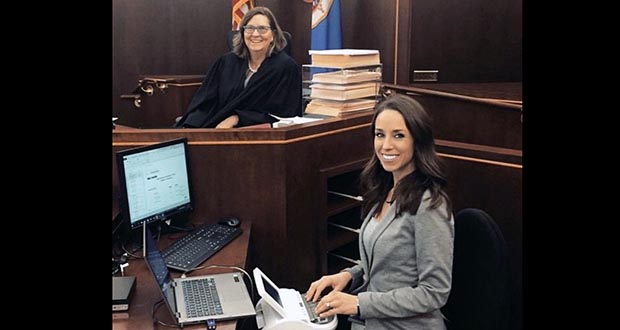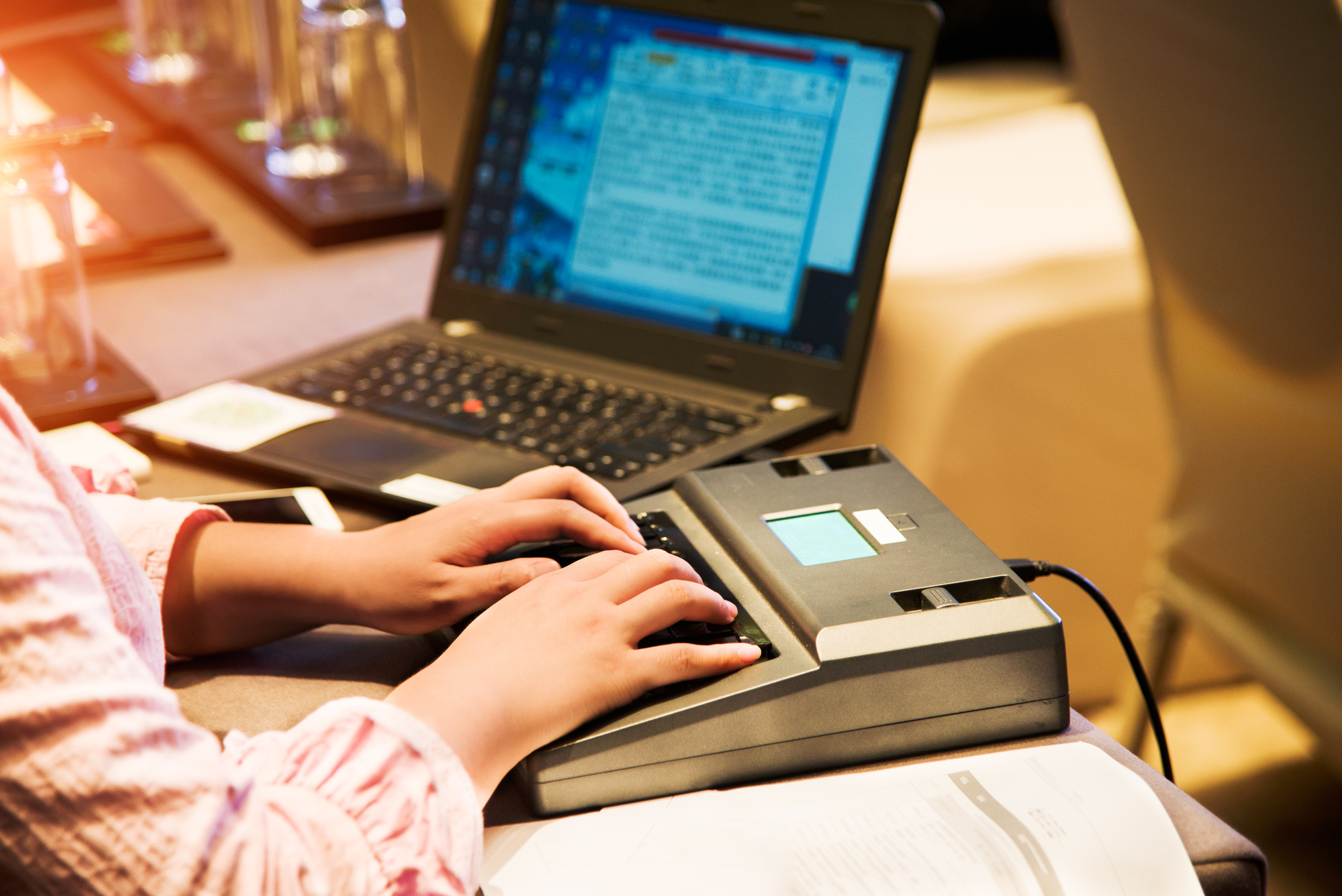Everything About Court Reporting: Essential Insights Into Its Significance in Legislation
Court reporting serves an essential feature within the legal structure, offering a exact and reputable document of procedures. Via innovative techniques and tools, court press reporters record the nuances of testimonies and legal dialogue. The value of their work expands past simple transcription. As the lawful landscape advances, so as well does the role of innovation in court reporting. Comprehending these characteristics discloses much deeper implications for justice and openness in the legal system.
The Role of Court Reporters in the Legal System

Typically forgotten, court reporters play a necessary duty in the lawful system by making certain a exact and verbatim document of process. Their key obligation entails recording spoken words during tests, depositions, and various other lawful occasions, which acts as an official record for future referral. This documents is very important for charms, as it provides the essential details for examining decisions made by juries and courts.
Court reporters need to have phenomenal paying attention skills and a deep understanding of legal terms to record the nuances of testament and argumentation accurately. Their work adds to openness within the judicial process, permitting for responsibility and fairness. Furthermore, they promote access to justice by making records readily available to included celebrations, guaranteeing that everyone has the chance to evaluate the proceedings. This way, court reporters maintain the integrity of the legal system, reinforcing the relevance of precise interaction in issues of legislation.
Methods and Tools Utilized in Court Reporting
In court reporting, different methods and tools boost the accuracy and efficiency of transcription. Stenography modern technology plays a considerable duty, permitting reporters to capture spoken words quickly, while digital recording approaches provide different services for documents. Recognizing these tools is important for realizing exactly how stenotype reporter fulfill their vital feature in the lawful system.
Stenography Modern Technology Summary
Stenography technology functions as the cornerstone of modern court reporting, allowing effective and precise transcription of talked discussion. Making use of specialized devices called stenographs, court press reporters can capture speech at amazing rates, typically surpassing 200 words per min. These equipments utilize an unique key-board design that allows multiple secrets to be pressed concurrently, producing phonetic depictions of words - durham court reporting. This method decreases the need for extensive spelling and enhances transcription accuracy. In addition, clerks use numerous shorthand methods and symbols to more simplify the process, making certain that no information is neglected throughout procedures. The assimilation of stenography technology not only cultivates efficient interaction in lawful settings however also promotes the integrity of the judicial process by providing reputable and precise records of conversations
Digital Recording Approaches
An increasing variety of court reporting specialists are transforming to digital recording methods to enhance the accuracy and effectiveness of their transcriptions. These strategies utilize advanced sound and video clip innovation to capture proceedings in real-time. Digital recorders, commonly paired with top notch microphones, ensure that every word spoken is maintained with quality. Additionally, specialized software application can record audio data immediately, enabling quicker turn-around times. Some specialists integrate dual recording systems for redundancy, assuring no crucial information is shed. In enhancement, digital recordings can be conveniently indexed and searched, promoting speedy retrieval of particular sectors. As legal settings develop, welcoming these electronic tools not just improves the reporting procedure but additionally maintains the integrity of the record.
The Importance of Precision in Transcription
Precision in transcription is necessary in court reporting, as it guarantees that lawful documents mirror real web content of proceedings. This precision can greatly influence instance outcomes, impacting the choices made by courts and judges. Maintaining high requirements of accuracy is extremely important in the lawful career.

Accuracy in Lawful Records
The legal system counts heavily on significant debates and persuasive rhetoric, the real foundation of judicial process lies in the precision of legal documents. Exact transcription is important, as it ensures that every inquiry, statement, and judgment is documented properly. Such precision offers numerous objectives, consisting of providing a trustworthy referral for allure procedures and keeping the honesty of the judicial system. Errors in transcription can bring about misconceptions, false impressions, and possibly detrimental consequences for all events included. Court reporters need to possess extraordinary skills and focus to information, as their job directly impacts the clearness of lawful papers. Eventually, the precision of lawful documents underpins the trust fund put in the judicial process, reinforcing the importance of thorough transcription.

Effect On Instance Outcomes
When lawful procedures unfold, the accuracy of transcription typically dictates the trajectory of a case's end result. Exact court reporting guarantees that every word spoken is effectively recorded, allowing judges, courts, and lawyers to make enlightened choices based upon the record. Mistakes in transcription can cause misunderstandings, false impressions, and possibly unjust judgments. The honesty of legal records depends greatly on the accuracy of these documents, as they serve as the foundation for appeals and more lawsuits. In high-stakes cases, where the effects are profound, the role of a stenotype reporter ends up being much more crucial. Preserving strenuous requirements in transcription not just sustains the lawful procedure however also upholds the principles of justice and justness in the court room.
Court Reporting in Different Lawful Setups
Court reporting plays a crucial function throughout different lawful setups, guaranteeing that process are accurately recorded for future reference. In criminal court, stenotype reporter record testimonies, evidence, and judicial rulings, which are critical for appeals and instance testimonials. In civil litigation, accurate transcripts assist in the exploration procedure and give a reputable document for test process. Administrative hearings frequently depend on court reporters to preserve an official record, guaranteeing transparency and responsibility in governmental processes. Household courts also benefit from court reporting, as accurate documents of process can affect guardianship decisions and negotiations. In addition, depositions in pre-trial phases need exact recordings to catch the nuances of witness testimonies, which may be significant fit instance methods. Generally, court reporting works as a cornerstone in the legal system, cultivating justness and clearness across varied judicial atmospheres.
The Impact of Technology on Court Reporting
As technology proceeds to progress, its influence on court reporting has actually ended up being progressively substantial. Innovations such as electronic recording, real-time transcription software application, and synthetic knowledge have actually transformed typical practices. Digital audio recorders currently catch courtroom procedures with amazing quality, enabling stenotype reporter to concentrate on subtleties and context as opposed to only on inputting. Real-time transcription technologies allow immediate accessibility to records, advertising effectiveness and Get More Info improving cooperation among lawyers. Additionally, man-made intelligence devices are being integrated to aid in the transcription process, minimizing human mistake and accelerating paper generation. In spite of these advancements, the essential skills of stenotype reporter continue to be invaluable, as they give a nuanced understanding of legal language and court room dynamics. Inevitably, technology matches instead than changes the competence of stenotype reporter, guaranteeing that the honesty and precision of legal paperwork are upheld in a significantly electronic landscape.
Profession Opportunities and Pathways in Court Reporting
The development of modern technology in court reporting has actually opened up a variety of job chances for striving experts in the area. Traditionally, court reporters were mainly in charge of transcribing legal procedures. Innovations such as electronic recording and real-time reporting have actually expanded their roles.
Today, court reporters can specialize in areas such as captioning for transmission, supplying transcription solutions for legal firms, and operating in the business field for meetings or depositions - durham court reporting. In addition, possibilities in remote reporting, specifically as a result of the surge of digital court rooms, have become increasingly prevalent
Educational paths consist of official training programs, accreditation training courses, and proceeding education to stay upgraded with technical modifications. Networking within legal and professional companies likewise plays a considerable role in career innovation. On the whole, the varied chances in court reporting show the vibrant nature of the legal profession and the raising demand for competent experts.
The Future of Court Reporting in an Evolving Legal Landscape
How will the duty of court reporting adapt as the lawful landscape remains to develop? As technology advances, court reporting is most likely to embrace cutting-edge tools such as artificial knowledge and real-time transcription software. These innovations might enhance precision and efficiency in catching legal procedures. Moreover, the raising occurrence of remote hearings necessitates that stenotype reporter become skilled in digital platforms, making certain seamless documents no matter of location.
At the same time, stenotype reporter will need to adjust their abilities to handle brand-new sorts of situations, such as those entailing cyber law and intellectual property conflicts, which call for specialized expertise. Additionally, the demand for instantaneous accessibility to transcripts will push experts to supply quicker turnaround times without jeopardizing high quality. Inevitably, the future of court reporting will certainly depend upon a balance between conventional abilities and technical integration, ensuring that the integrity of the legal process stays undamaged in a significantly electronic globe.
Regularly Asked Questions
Just How Do Stenotype Reporter Take Care Of Delicate Details Throughout Procedures?

What Credentials Are Required to End Up Being a Court Reporter?
To come to be a court press reporter, individuals generally need a secondary school diploma, specialized training from a recognized program, efficiency in shorthand or voice writing, and certification or licensure, relying on state demands and guidelines.
Are Court Reporters Required to Have a License?
Stenotype reporter are commonly needed to obtain a certificate, depending upon the territory. Licensing assurances that they meet certain criteria of effectiveness and expertise, which is crucial for maintaining the honesty of legal proceedings.
Exactly How Do Stenotype Reporter Handle Different Accents and Dialects?
Court reporters take care of various accents and languages through substantial training, method, and knowledge with different speech patterns. They often make use of specialized software application and techniques to properly capture talked words, ensuring clearness and accuracy in their transcripts.
What Is the Typical Salary for a Stenotype Reporter?
The average income for a stenotype reporter varies by place and experience, commonly ranging from $50,000 to $80,000 every year. In high-demand areas, incomes can my website go beyond $100,000, reflecting the occupation's value and specialized abilities.
Frequently ignored, court reporters play a crucial role in the legal system by making sure a verbatim and accurate record of proceedings. In more criminal court, court reporters record testimonies, evidence, and judicial rulings, which are vital for allures and instance reviews. Family courts likewise profit from court reporting, as accurate documentation of proceedings can influence protection choices and negotiations. Commonly, court press reporters were mostly liable for recording lawful procedures. Today, court press reporters can specialize in locations such as captioning for television broadcasts, giving transcription services for legal companies, and functioning in the company field for conferences or depositions.